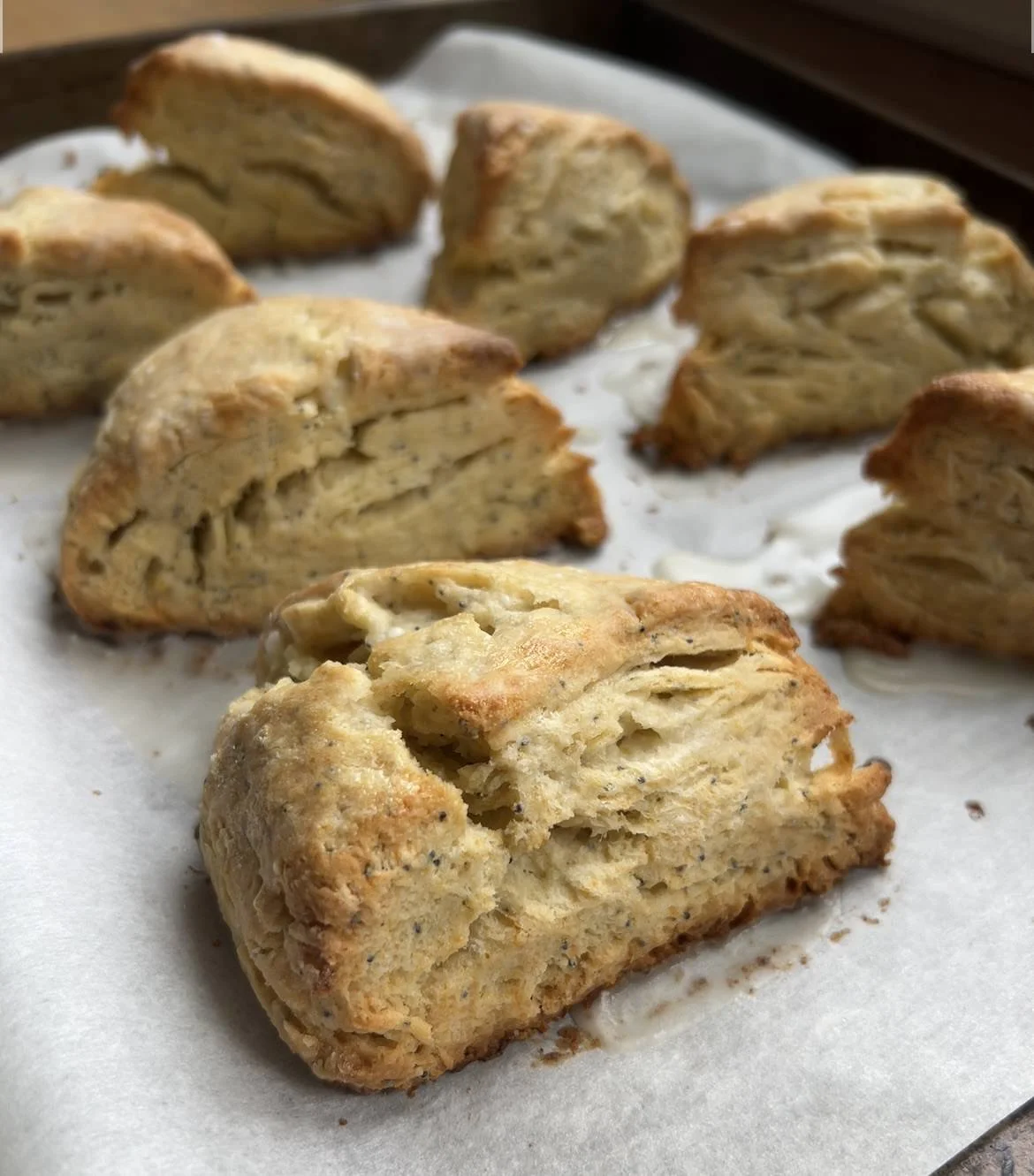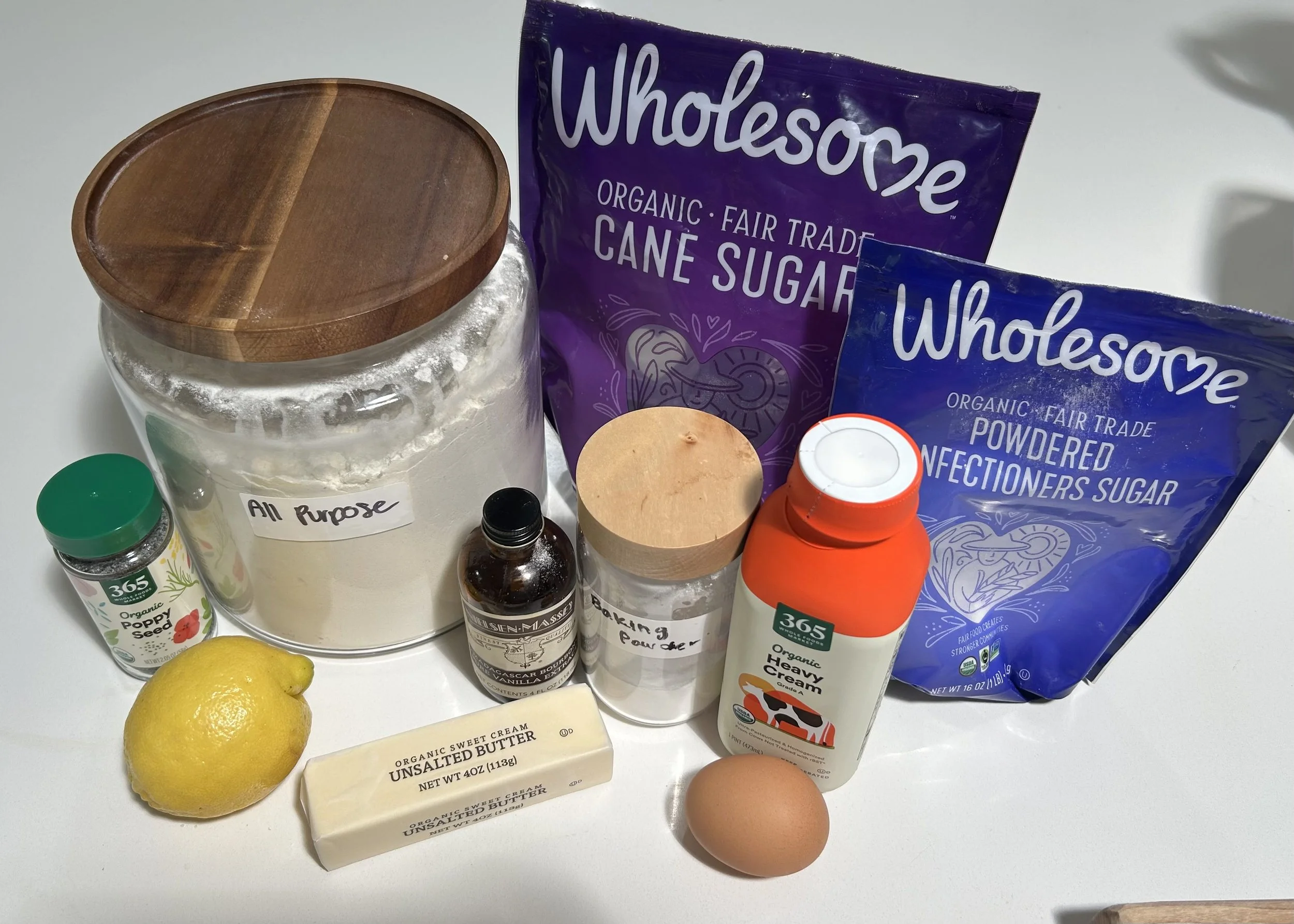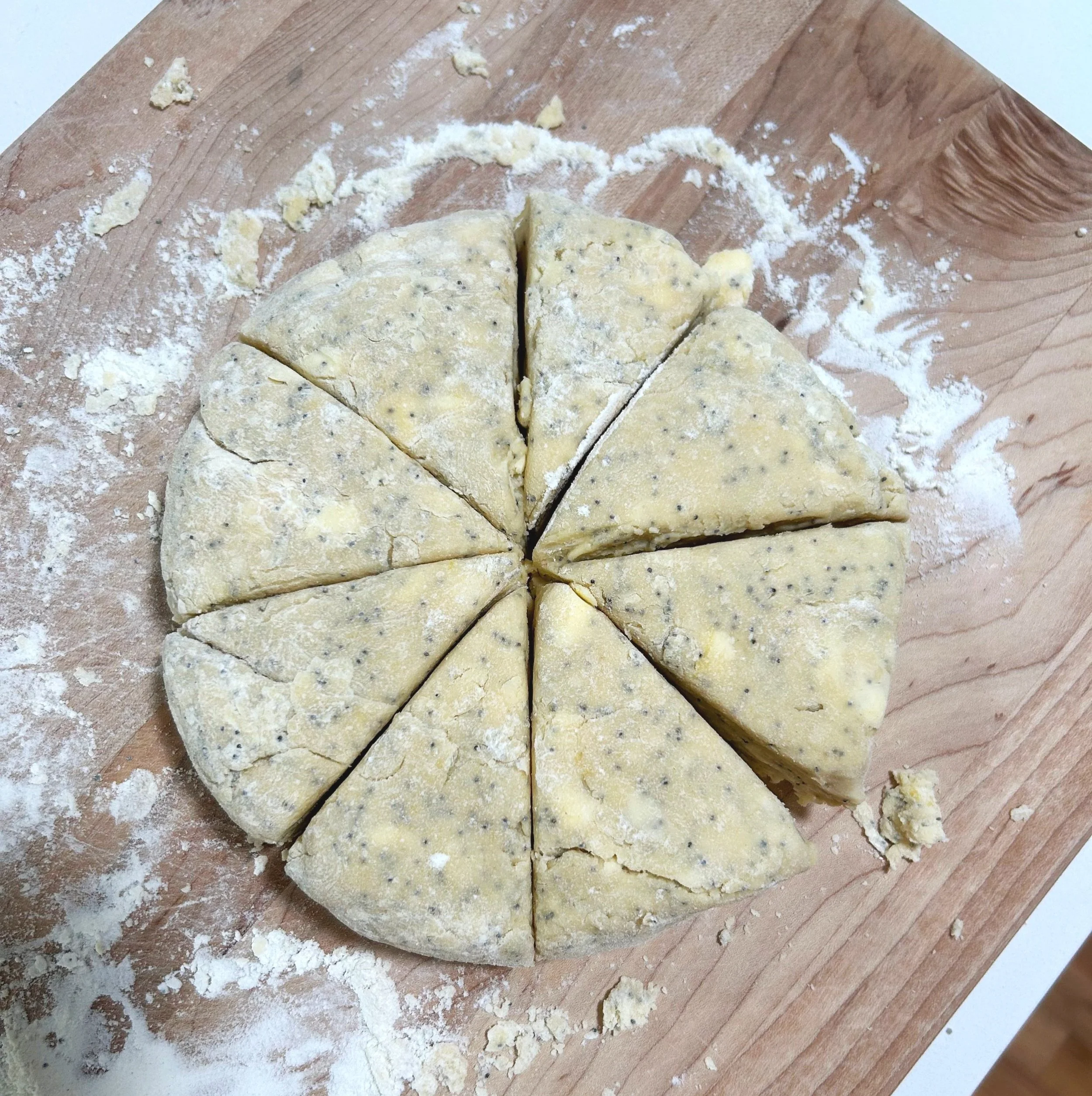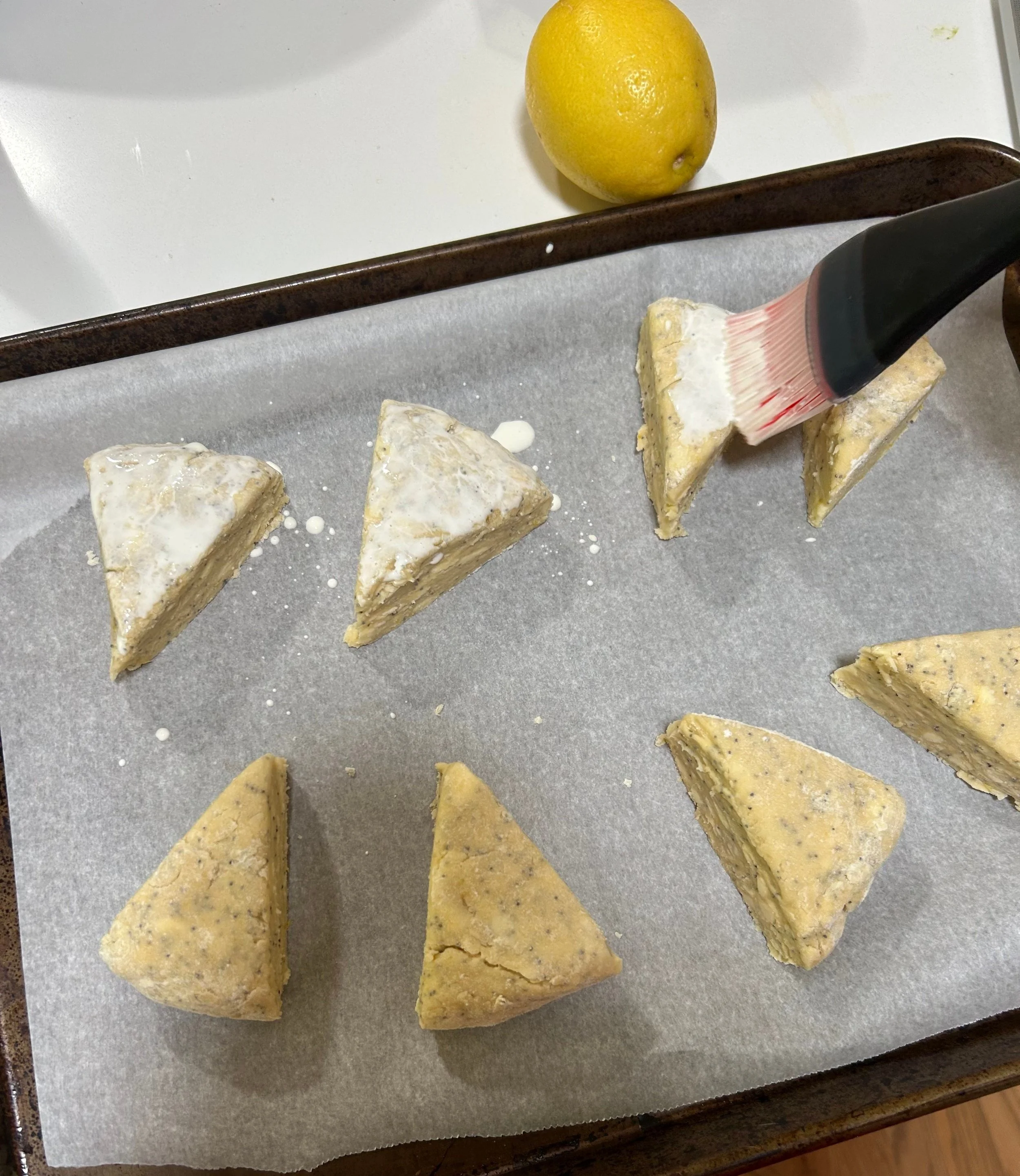Lemon Poppy Seed Scones
In my opinion, the best sweet treats are subtly sweet and have a satisfying, rich texture. That’s exactly what you’ll find in this lemon poppy seed scones recipe. These scones have a slight tang from the fresh lemon juice used in the glaze, decadence from the cream and butter, and lemon flavor throughout from the fresh zest used in the dough.
Can lemon poppy seed scones be made in advance? Yes, you can make lemon poppy seed scones and store them for up to 5 days at room temperature. To make sure they last for as long as possible and stay fresh, store them in an air-tight container or a zipper bag. This helps avoid the lemon poppy seed scones from going stale, which can make them dry and unpleasant. Alternatively, if you store them in the fridge, these scones will last for up to a week in an air-tight container.
Can lemon poppy seed scones be frozen after baking? Yes, you can freeze lemon poppy seed scones after you bake them for a quick sweet treat or breakfast at your fingertips. For best results, wrap each scone in a plastic wrap and store them in a freezer-safe zipper bag. This way, you will avoid any additional air getting to the scones and making them either freezer-burned or dried out. For best results, when time to eat the scones, pull them out of the freezer to defrost for a few hours or in the fridge overnight. If a few hours seems like too long to wait, gently warm them in a toaster oven or oven until they’re deliciously warm and ready to enjoy.
How to tell when lemon poppy seed scones are finished? When scones are finished baking, you can tell because they have risen to reveal delicate layers of pastry, and they have slightly browned on top. An under-baked scone will appear to be flat (without any layers showing) and still appear to have pale dough on the top. I always recommend airing on the side of over-baking desserts instead of under-baking them, so when in doubt, be sure to add a few extra minutes of baking to this recipe and monitor it closely until you see these visual cues.
How long do you bake lemon poppy seed scones? Lemon poppy seed scones bake rather quickly at 375 degrees Fahrenheit for just 20 minutes. This gives the dough enough time to rise and become delicately flaky, as well as develop a beautifully brown crust on top.
What temperature should you bake scones at? I recommend baking scones at 375 degrees Fahrenheit. This temperature is gentle enough so the scones can bake fully without browning too fast, but hot enough where you’ll see the dough rise in nice fluffy layers and develop a beautiful crust on top.
How do you get a nice golden crust on scones? The secret to developing a golden crust on scones is to paint them with a light layer of cream on top before baking. The fat in the cream gently fries the top of the scones and leaves them with a beautiful, crispy brown layer on top while maintaining a delicate, fluffy interior.
What type of flour is best for scones? All-purpose flour is the preferred type of flour to bake scones. It has the perfect amount of gluten in it to create a perfectly crumbly scone. Other alternative flour choices are:
Cake flour. This has less gluten in it than all-purpose flour, which will lead to much lighter and delicate scones, sacrificing some of the rich, crumbly texture scones are known for.
Self-rising flour. This type of flour contains ingredients such as salt and baking powder, so you’ll see decent results from this type of flour, but you’ll have to adjust the recipe to account for these additions.
Bread flour. This flour has a higher protein count than all-purpose flour, which can lead to a chewy scone.
Whole wheat flour. Although I typically recommend whole wheat flour as a decent substitution for all-purpose flour, I don’t in the case of this lemon poppy seed scone recipe. That is because whole wheat flour is higher in fiber, and therefore can dry out the scone dough.
How much should you knead scone dough? You don’t need to excessively knead scone dough to achieve crumbly and light scones. I recommend only working the dough until it has come together in a uniform, hydrated consistency. If you over-knead scone dough, it activates the glutens in the flour and can lead to the dough being tight and dense.
Why are my scones crumbly? Scones are naturally a flaky pastry, but you don’t want them to cross over into the territory of being too dry. The butter and cream in this recipe should fully hydrate the dough of these lemon poppy seed scones, but if you notice that the texture of the scones’ batter seems to crumble apart and won’t stick together, add more milk gradually until you see a cohesive dough.
How to make lemon poppy seed scones:

Lemon Poppy Seed Scones
Bright, citrusy, and flaky, these lemon poppy seed scones are the perfect balance of zesty lemon and sweet cream flavor—ideal for breakfast, dessert, or a sweet treat anytime.
Ingredients
- 2 cups all-purpose flour
- 1/4 cup granulated sugar
- 1 tbsp baking powder
- 1/2 tsp salt
- 1 tbsp poppy seeds
- Zest of 1 lemon
- 1/2 cup cold unsalted butter, 1 stick
- 2/3 cup heavy cream (plus extra for brushing)
- 1 egg
- 1 tsp vanilla extract
- 1/2 cup powdered sugar
- 1-2 tbsp lemon juice
Instructions
- Preheat oven to 375 degrees Fahrenheit. Line a baking sheet with parchment paper and set it aside.
- In a large bowl, mix flour, sugar, baking powder, salt, poppy seeds, and lemon zest.
- Cut the butter into very small chunks and work it into the flour mixture. This process is pushing the butter into the flour until the butter resembles coarse crumbs.
- In a separate bowl, mix the cream, egg, and vanilla. Gradually add this wet mixture to the flour mixture and stir until just combined into a shaggy dough.
- Turn dough onto a floured surface and pat it into a 1-inch-thick circle. Cut into 8 wedges.
- Place the scones on the parchment-lined baking sheet and brush the tops lightly with cream.
- Bake for 20 minutes or until golden brown on top. Cool the scones on a wire rack.
- Drizzle with lemon glaze once cooled.






